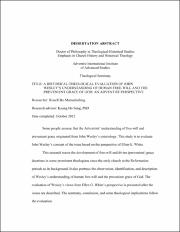A historical-theological evaluation of John Wesley's understanding of human free-will and the prevenient grace of God : an Adventist perspective
Abstract
Some people assume that the Adventists’ understanding of free-will and
prevenient grace originated from John Wesley’s soteriology. This study is to evaluate
John Wesley’s concept of the issue based on the perspective of Ellen G. White.
This research traces the development of free-will and divine (prevenient) grace
doctrines in some prominent theologians since the early church to the Reformation
periods as its background. It also portrays the observation, identification, and description
of Wesley’s understanding of human free-will and the prevenient grace of God. The
evaluation of Wesley’s views from Ellen G. White’s perspective is presented after the
issues are described. The summary, conclusion, and some theological implications follow
the evaluation.
The primer sources of this research focuses only on the writings of John Wesley
and Ellen G. White. Both Wesley’s and White’s concepts on human free-will and
prevenient grace have been gathered from their published and unpublished works as well
as from the Internet. Other authors who have also written about Wesley’s and White’s
understandings on those issues have been considered. The evaluation is based on the
materials collected.
Since the beginning of the church, Christianity has adopted the teachings of
Augustinianism, Pelagianism, and semi-Pelagianism. Meanwhile, Wesley’s view of freewill
and prevenient grace are not in the line of Augustinian/Calvinistic or semi-Pelagian,
but Arminian. Furthermore, an evaluation proves that even though Ellen G. White was an
ex-Methodist, and in some extent she was influenced by Wesley’s teaching, all of her
teachings were confirmed by God through the work of the inspiration of the Holy Spirit.
Nevertheless, White affirms Wesley’s view that salvation is a co-operative work between
God and man. The role of a human being in salvation is not only to refuse the prevenient
grace, which is worked by the Holy Spirit. However, both Wesley’s and White’s views
on free-will and prevenient grace may fall between Augustinian’s or Calvin’s soteriology
or anthropology. Both Wesley’s and White’s teachings stand somewhere between
Calvin’s divine-monergism and semi-Pelagian human-monergism. Their views promote
divine-human synergism. White’s view critiques and disagrees with Wesley’s views on
free-will and prevenient grace when those issues are linked to Wesley’s understanding of
grace before and after the fall of humanity, his dualism anthropology, and dualism
hamartiology. White’s view approves some and disapproves other parts of Wesley’s
concept of the free-will and prevenient grace. Therefore, Wesley’s teachings seem close
yet so far from White’s view.


